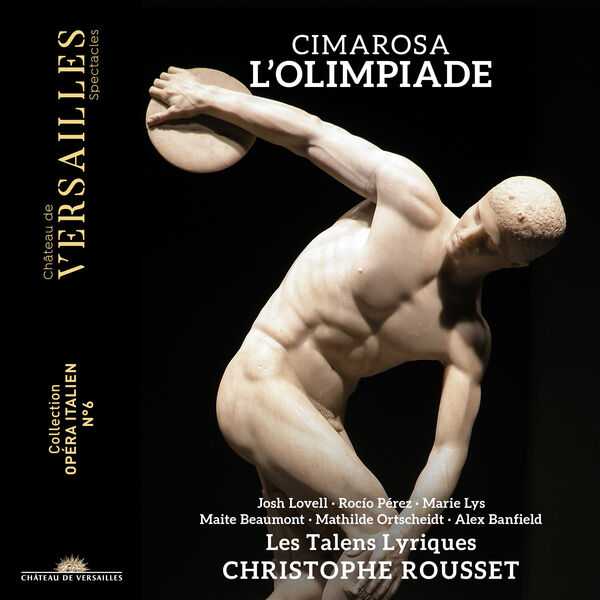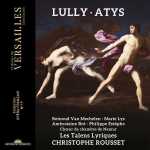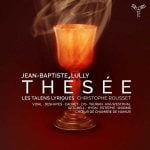

Composer: Domenico Cimarosa
Performer: Josh Lovell, Rocio Pérez, Mathilde Ortscheidt, Alex Banfield, Maite Beaumont, Marie Lys
Orchestra: Les Talens Lyriques
Conductor: Christophe Rousset
Format: FLAC (tracks)
Label: Château de Versailles Spectacles
Catalogue: CVS143
Release: 2024
Size: 2.7 GB
Recovery: +3%
Scan: yes
L’Olimpiade
CD 01
01. Sinfonia
Act I
02. Scene 1: Recitativo. “Ho risoluto, Aminta”
03. Scene 1: Aria. “Siam navi all’onde algenti”
04. Scene 2: Recitativo. “Misero! E fui sì cieco”
05. Scene 2: Aria. “Superbo di mes stesso”
06. Scene 3: Recitativo. “O generoso amico!”
07. Scene 3: Aria. “O care selve”
08. Scene 4 – Scene 5: Recitativo. “Ecco Aristea” – Recitativo. “Figlia, tutto è compito”
09. Scene 5: Aria. “Del destin non vi lagnate”
10. Scene 6: Recitativo. “Udisti, o Principessa?”
11. Scene 6: Aria. “Tu di saper procura”
12. Scene 7: Recitativo. “Dunque Licida ingrato”
13. Scene 7: Aria. “Fra mille amanti un core”
14. Scene 8: Recitativo. “Licida. Amico.”
15. Scene 8: Aria. “Mentre dormi”
16. Scene 8: Accompagnato. “Che intesi eterni Dei!”
17. Scene 9: Recitativo. “Stranier? Chi mi sorprende?” – Accompagnato. “E mi lasci così ?”
18. Scene 9: Duetto. “Ne’giorni tuoi felici”
Act II
19. Scene 1: Recitativo. “E trovar non poss’io”
20. Scene 1: Aria. “In un cor, que fu piagato”
21. Scene 2: Recitativo. “Questi d’un labbro infido”
22. Scene 3: Accompagnato. “Io compiango il tuo duol” – Aria. “Grandi, è ver, son le tue pene”
CD 02
Act II
01. Scene 4 – Scene 5: Recitativo. “Giovane valoroso” – Recitativo. “All’odiose nozze”
02. Scene 5: Aria. “Bell’alme innamorate”
03. Scene 6 – Scene 7: Recitativo. “Fra l’amico e l’amante” – Recitativo. “Oh, ricordi crudeli!” – Accompagnato. “Senti… Ah, no… Dove vai?” – Accompagnato. “Misero me, che veggo”
04. Scene 8: Accompagnato. “Intense tutto, Aristea ?”
05. Scene 8: Aria. “Se cerca, se dice”
06. Scene 9 – Scene 10 – Scene 11 – Scene 12: Recitativo. “Che labirinto è questo” – Recitativo. “A me, barbaro ?” – Recitativo “In angustia più fiera” – Recitativo. “Difendetemi il padre”
07. Scene 13: Recitativo. “Eppur, mi fa pietade…”
08. Scene 13: Aria. “Torbido il ciel s’oscura”
09. Scene 14: Recitativo. “Giusti Dei! Che sarà”
10. Scene 14: Accompagnato. “Qual poter, qual incanto”
11. Scene 14: Aria. “Mi sento, oh Dio! Nel core”
12. Scene 15: Recitativo. “Stelle, vi sono in cielo”
13. Scene 15: Aria. “Spiegar non posso appieno”
14. Scene 16: Accompagnato. “Giovane sventurato!”
15. Scene 16: Aria. “Non so donde viene”
16. Scene 17: Recitativo. “Ah, vieni, illustre esempio”
17. Scene 17: Accompagnato. “Ah barbari fermate!”
18. Scene 17: Aria. “Nel lasciarti”
19. Final Scene: Recitativo. “Fermati, o Re”
20. Final Scene: Finale. “Quanto mai, per sì gran dono”
Born in 1749, Cimarosa was one of Europe’s leading composers at the end of the 18th century. It was during his most productive period that he produced his Olimpiade, a grand opera seria transformed into a sumptuous bel canto drama. In it, Cimarosa brings heroism to the athletes competing in the Games in Olympia, the winner of which will marry Princess Aristea: the seemingly inextricable plot allows the composer to write some of the most extraordinary arias based on Metastasio’s libretto. Christophe Rousset, champion of the Italian repertoire of the end of the 18th century, leads a dazzling cast in this hurricane of bel canto!
Domenico Cimarosa is known (when at all) for comic operas like Il matrimonio segreto (1792), but among his 80 operas are also serious works like the one on the present album. This recording of L’Olimpiade was released in 2024. The plot concerns the original Olympic games in Greece, where a winner was betrothed to the king’s daughter, Aristea, and someone should mount a production to coincide with the Paris Olympics (no word on whether that was the intent here). The work is hardly known today (although this is not the premiere recording), but in its own time, it was a hit, with repeat productions mounted over the next quarter century after the opera’s 1784 premiere. L’Olimpiade is based on a Pietro Metastasio libretto that lasted as far into the future as an unfinished opera by Donizetti. The work would be classed as opera seria, but it is not a ponderous, heroic thing; the listener is apt to come away humming some of the tunes. Mozart’s Idomeneo, which Cimarosa may well have known, would be a general comparison. Both operas highlight virtuoso work for the lead soprano, and a major attraction here is the work of Rocío Pérez as Aristea, the strongest in a cast of near equals. Conductor Christophe Rousset, directing Les Talens Lyriques from his fortepiano keyboard, delivers an energetic performance; hearing the opening Sinfonia, one might think the performance is going to be too much in the punchy Baroque vein, but he gives the arias room to breathe. Rousset and company make a case for the work in the repertory. Anyone may enjoy this performance, and the album made classical best-seller lists in the spring of 2024.



